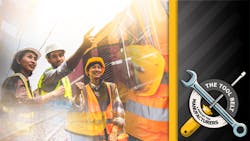Podcast: The ABCs of EHS — How the industrial safety profession is evolving
Dave Blanchard is editor in chief of Material Handling and Logistics and EHS Today. During his career, Dave has led the editorial management of many of Endeavor Business Media's best-known brands, including Industry Week, Logistics Today, Supply Chain Technology News, and Business Finance, in addition to the two titles he currently manages. He also serves as a senior content director of the annual Safety Leadership Conference and literally wrote the book on supply chain management, which is called Supply Chain Management Best Practices. He is also a voting member of the jury of the Logistics Hall of Fame and is a graduate of Northern Illinois University. Plant Services editor in chief Thomas Wilk recently spoke with Dave about the evolving fields of safety and logistics, and what companies can do to keep supply chains and workers healthy and productive.
DB: I suppose we should have gone over what you were going to introduce me with, because you just used up about my first three paragraphs of my background! (laughs) Which is just as well, because this way I can focus on what I'm doing now.
I'll give you a really quick introduction to my career, besides what you just mentioned. I actually started way, way, way, way back in the previous century, as they say. I was a high school English teacher, that’s how my career started. I had taken a lot of journalism classes at school as well, but I thought English teacher was what I really wanted to be.
I did that for a couple years and then I realized I really, I really had a hankering and I really found a passion for writing and journalism, and writing articles and doing a lot of research and all the things that editors do with their careers. I've been in journalism for quite a while now, starting my career actually in the ’90s. I covered artificial intelligence! This was back in the early 1990s and even back then people were saying that artificial intelligence was just going to completely change the world, and nothing was going to be the same ever again. So I've seen the hype cycle of AI a couple times already. Right now, maybe it'll pay off with ChatGPT and everything else that's going to change the world, we'll see.
But I followed AI for a long time and then I started working for Penton Media right in 1999, so right at the turn of the Millennium. And then Penton became Informa, and Informa sold off a lot of their brands to the company I work for now, Endeavor Business Media. So I've kind of had the same business card, it’s just the corporate logo on the business card changes over the years. I've been working on Industry Week and Logistics Today and a lot of other brands, but right now I my main two gigs are the editor in chief of Material Handling and Logistics, our supply chain brand; and EHS Today, our safety brand.
PS: You’re in a special position, given all the pressures in the past couple years on supply chain especially. Plant Services readers let us know that’s their top priority right now. As things are evening out, that was really my first question for you: given all the stress tests that we've had in the global supply chain, what's your sense on how it's doing this year? Are things going to get back to normal or at least back to a new normal?
DB: That's another one of those questions that I don't want to sound like I'm the old man on the mountain, but I have gone through a couple different supply chain disruption cycles over just since the year 2000, so maybe to some people that sounds like a long time ago (to me it doesn’t really sound like that long ago). In 2001, we had 9/11 which was going to just change the supply chain as we knew it forever. I mean, just the whole idea of traveling and supply chain.
Global supply chains were just not ever going to be the same because you had to have security measures in place that we really just going to slow down the supply chain to a crawl. Getting everything X-rayed before you could put it on a plane or a truck or a train, or any other kind of transportation vehicle. That was just going to slow down the supply chain forever. But we figured out ways to get past that really quickly.
And then from the economic point of view, although I guess a little bit of a pandemic point of view too, 15 years ago we had the Great Recession from the banking crisis, the housing crisis, and then we had the SARS virus, that and the avian flu and all these different situations that people thought, supply chains just aren't going to be able to recover from this because people are just not going to be able to trust the situation that that that's coming up.
I guess with the pandemic that we're hopefully in in the rearview mirror now. It did a number on the supply chain, probably bigger than those other events did just in terms of the supply chain itself kind of took a hit, at least in terms of perception. People at the early days of the pandemic – and there were a lot of articles because I wrote some of them – it was all about how hard it's going to be to get toilet paper, and the wait time for buying a new car, or a couch or a refrigerator or all sorts of consumer goods. I was going to be months and months and months and people just got really impatient, and companies were quick to say, “hey, you know, this is this is a supply chain problem. It has nothing to do with us.”
In some cases, it was a legit supply chain problem, but it was a supply chain problem because the whole experience of buying products itself kind of was turned on its head. And if you were typically going into an office, you weren't thinking about how you're going to stock your house for 24 hours a day; you were thinking, well, I'm away at work and I'll eat lunch downtown and I'll use the computers at work and I'll use the copy machine at work, and everything that you just kind of took for granted. Now you're doing that – and not just you, but the whole country was doing that– out of their homes for months. Office products became very hard to come by and other consumer products became very hard to come by for a while because the whole workplace changed.
PS: You know, it's funny Dave, the only consumer product that I really have trouble finding to this day is a certain brand of 3-oz disposable bathroom cups. And as far as I can tell, that's not really even a supply chain issue. That's more of a plant consolidation and employment issue, where there's still trying to find people to staff that plant and get it up and running, and it simply may not be a financial priority. So from a consumer level, it's tough to point to anything in particular right now where supply chain’s holding it up.
I hear more often about the parts holdups for, say, Boeing jets being built, and there were supply chain challenges with microchips there for a while, but even that seems to be sort of training itself out finally.
DB: Yeah, Boeing has said supply chain issues for 20 years, so this is nothing new for Boeing, and it's the same case for any sorts of products. I mean, if something needs to be made and delivered, it will get done. You used that keyword “priority,” it becomes a priority for companies. If the certain type of cups that you were talking about, if they're not a priority, then the supply chain’s not going to react to they’re being short staffed.
Read the rest of the transcript
About the Author

Thomas Wilk
editor in chief
Thomas Wilk joined Plant Services as editor in chief in 2014. Previously, Wilk was content strategist / mobile media manager at Panduit. Prior to Panduit, Tom was lead editor for Battelle Memorial Institute's Environmental Restoration team, and taught business and technical writing at Ohio State University for eight years. Tom holds a BA from the University of Illinois and an MA from Ohio State University
